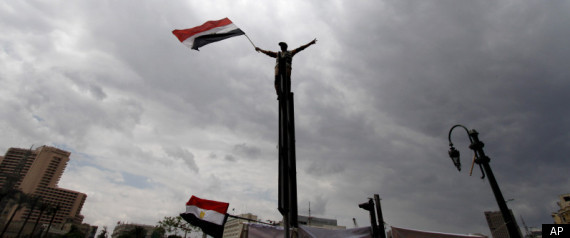CAIRO — The once outlawed Muslim Brotherhood said Saturday its new political party will contest half of the seats in Egypt’s parliamentary elections in September, revealing plans to become a major force in the country’s post-revolution politics.

Egypt’s largest Islamic group and the best organized opposition movement during ousted President Hosni Mubarak’s three decades of autocratic rule sought to ease concerns that it is intent on bringing about an Islamist-dominated parliament.
“This is not a religious party, not a theocratic party,” its newly named leader, Mahmoud Mosri, told reporters Saturday. He described the platform of his Freedom and Justice party as civil but with an Islamic background that adheres to the constitution.
The popular uprising that toppled Mubarak on Feb. 11 was driven by broad swaths of Egyptian society, and secular-minded youth activists, in particular, watched with concern as Brotherhood supporters joined the revolution once it was clear it had momentum.
They fear it will forge alliances with other Islamic groups, like ultraconservative Salafists, to dominate parliament and impose Islamic Sharia law in all aspects of life, limiting freedom of expression and dubbing their opponents infidels.
The new party will test to what extent the Brotherhood is willing to moderate its rigid religious discourse to try to win broader political support.
It is well positioned to win big in September’s elections. Having survived years of attempts by Mubarak’s regime to suppress it, the Brotherhood is the best organized political force in the country now that the ex-president’s ruling party has been disbanded.
The activists behind the uprising have yet to catch up and fear they will not be ready by September to rally large numbers of voters.
Mindful of the unease, the Brotherhood has adopted the motto “Partnership, not supremacy” and its leaders are careful to use inclusive political language when talking about Egypt’s post-Mubarak future. The group has also pledged not to field a candidate in November’s presidential election.
“We are facing a critical challenge to transform from pharaonic rule to people’s rule, with a free parliament and elected Cabinet,” leading Brotherhood member Essam el-Arian said.
However, the goal of winning half of parliament’s 508 elected seats was unexpected after an earlier pledge by leaders to contest just a third of the seats.
Brotherhood leaders told Saturday’s news conference at the group’s new headquarters that the political party will be separate and independent from the religious group.
The party’s caucus will be open to Muslims, Christians and women, said another Brotherhood politician, Mohammed Saad el-Katatni. Brotherhood members, however, are barred from joining any other party.
In past parliamentary elections, the Brotherhood successively fielded candidates as independents despite being officially outlawed.
Ammar Ali Hassan, an expert in Islamic movements, said the Brotherhood is facing a dilemma since it will have to function through legitimate channels for the first time in decades.
Other factors have shifted.
Under Mubarak’s rule, Hassan said, turnout was dismally low due to widespread vote-rigging and fraud. And some of those who voted for Brotherhood candidates were driven by their resentment of Mubarak’s ruling party, not necessarily genuine support for the group, he said.
“The Brotherhood fed off both the apathy and the resentment. These two elements served the group’s interest and now both don’t exist,” he said.
Besides its transition to democracy, Egypt is also trying to reckon with its past under Mubarak’s rule. The former president and his sons are in custody and are being questioned over corruption allegations and the killings of at least 846 protesters in the crackdown.
Egypt’s new justice minister said Mubarak might face the death penalty if convicted of ordering the shooting of protesters, a newspaper reported Saturday.
Mohammed el-Guindi was quoted by the daily Al-Ahram as saying that the key to the case is whether former Interior Minister Habib el-Adly, also under investigation, would testify that Mubarak had given the order to open fire on protesters.
Mubarak, 82, is in custody at a hospital in the resort town of Sharm el-Sheikh where he was taken earlier this month for heart problems.
The minister also accused Mubarak of engendering a culture of corruption in the government, and he said the former president’s wealth came from gas exports to Israel through a company owned by a personal friend and from arms deals, the paper reported.
Suzanne Mubarak, the ex-president’s wife, will also be investigated and her questioning will start within days, the minister was quoted as saying.
Mubarak’s wife, who was involved in a number of high-profile charitable ventures, is suspected of illegally amassing wealth through her non-governmental organizations.
MAGGIE MICHAEL










































